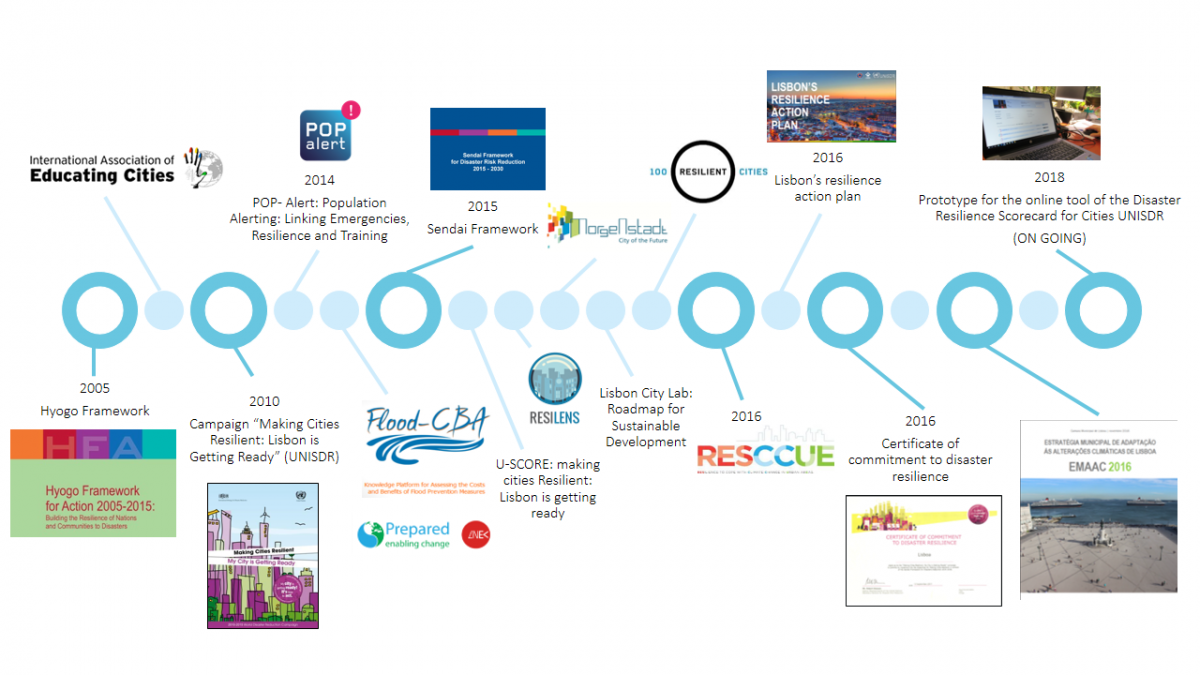14. 02. 2018
CLIMATE CHANGE COMMUNICATION: A CHALLENGE FOR LISBON
BY MARCO MORAIS and Maria Telhado, LISBON CITY COUNCIL
Since 2010, following the appeal of Hyogo framework, Lisbon joined to the Campaign Making Cities Resilient. In articulation with the National Authority of Civil Protection and Lisbon City Council, joint efforts to promote the urban resilience of the cities from Portugal were initiated.
The timeline below depicts the path done until today in the scope of Resilience, corresponding to the statement of the effort and commitment that several interlocutors of Camara Municipal de Lisboa (CML) have dedicated to the policy followed to increase the Resilience in Lisbon city.

The participation of the Lisbon City Council in the RESCCUE project represents another challenge in the implementation of an innovative policy to promote city’s urban resilience, as a dynamic and modern system facing climate change scenarios. Following the goals of this project, the resilience approach intends to evaluate the level of interdependencies created between key sectors providers of basic services in a disruptive event, the strengthening of partnerships between key actors and the promotion of autonomy, all of them responsible to promote “A BETTER CITY”.
Communication and dissemination are crucial concepts when referring to EU-funded projects since they represent the information and knowledge flow, one of the main objectives of any European public initiative. Following this principle, the Municipal Civil Protection Service in the role of CML interlocutor along these 20 months of RESCCUE project has participated on several dissemination activities aimed at promoting three main goals: Educational, Informative and Behavioural. These dissemination activities intend to:
– transfer the outputs of the project using several channels;
– reach different end users;
– promote present materials developed;
– present results;
-create an innovation strategy to implement the resilience process.
Until now the key actors involved in this process were stakeholders from the Lisbon municipality and external partners from public and private organizations, some of them decision-makers and basic city services managers, researchers and experts. All of them are responsible for carrying out the diagnosis of the city and also for setting future urban resilience strategies to strengthen the Lisbon’s Action Plan based on strong adaptation, mitigation and territory recovery strategies, always considering the way of life of the population and future climate change scenarios. This multidisciplinary team, apart from the Portuguese RESCCUE project team, also involves experts from different municipal services such as: emergency, solid waste, mobility, vehicles fleet, ICT, urban planning, environment and energy, climate change, urban drainage and the mission’s team from the municipality. In addition, there were involved the public transports (METRO and CARRIS) and the Center for innovation and technology of the Portuguese Institute for Sea and Atmosphere (IPMA).
Based on sharing information, the CML participation in this project has contributed to increase the city resilience to climate change, technologically capable to monitor and report in real time to the decision-makers and citizens, having at the same time intelligence and knowledge to solving problems, to raise awareness on the adoption of measures and behaviors for the protection of cities and the way of living of its inhabitants. This way a step up is given in terms of visibility, utility, usability and an opportunity to collaborate, innovate and strengthen partnerships between key actors and the citizens.
Following, it is described the work carried out by Lisbon City Council in the framework of the resilience Workshop “How to make Lisbon city more resilient | An opportunity to strengthen communities”, on the 12th December 2017.
The event was attended only by Portuguese participants, experts involved in the process of implementing urban resilience in Lisbon city, including 20 both private and public entities of national, regional and local levels and managers and operators of critical infrastructures, and representatives of 9 different departments of the CML, among others. In total, 66 volunteer participants, of whom 50% male and 50% female representatives. The workshop consisted in two practical exercises during which the groups analysed different scenarios of meteorological extreme events, taking into account the potential impacts over the municipal territory across three consecutive days.
The first exercise allowed the participants to:
– feature the autonomy level of the entities present in relation to basic services/sectors of activity;
– create interdependencies map flows between the different sectors of activity from the perspective of customers and suppliers;
– identify measures to be implemented in order to affect interdependences in the following dimensions: Communication/information, Replacement of services, Liaison agents, Regulation/Legislation, Finance, Plans and Processes.
The approach followed during the second exercise allowed to discuss the importance of the collaboration among the public bodies and the key actors involved in a disruptive events, for example, the local entities that manage the territory and are responsible for the maintenance of the most important city functions. The methodology followed in this exercise was based on the terminology used by Civil Protection in terms of emergency intervention areas, such as:
- Means and resources (administrative, financial, logistics, communications)
- Support to the citizens (psychosocial, emergency housing, food)
- Public information (warnings, alerts, announcements)
- Health (medical emergency, public health, mortuary, veterinary)
- Technical services (heritage, clearing and removal of debris, recognition and assessment of damage)
The workshop provided the ability to obtain valuable results powered by several entities and partners sharing together their experience and technical, scientific and operational knowledge that gives useful outputs to deal with the mitigation of risks, disasters and extreme climatic events and to contribute to strengthening Lisbon’s urban resilience.
Making Lisbon a more resilient city requires a significant investment in building strong alliances, including the participation of the civil society. In this sense, a step was taken with the abovementioned workshop as the feedback obtained is very valuable in achieving the proposed goals. Moreover, this local strategy fits simultaneously into the four priorities set by Sendai Framework for 2015-2030.
